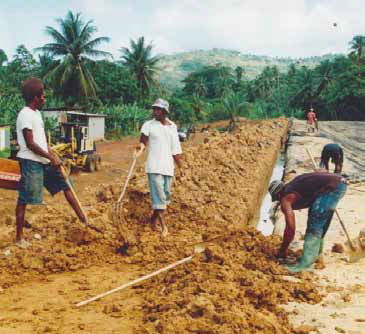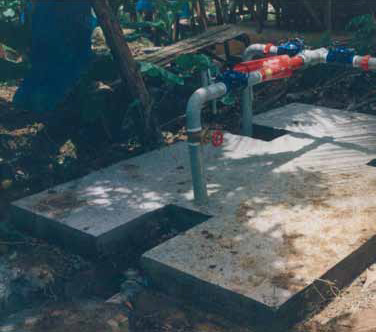Early in life it is taught that plants are living things, and all living things require water to survive and grow. In agriculture, land and water are the two most important controllable elements. In an effort to expand the banana industry on the island, a system was created to manage the water on farms so as to create and maintain a level of stability of crop production. The BIT was given the mandate to implement the Banana Commercialization Programme with funding from the EU Special Framework of Assistance (SFA) 1999 Grant Contracts. The funding totaled EC$10.2 million, with the focus on the major banana growing areas, and included the following:

SFA 1999
Overview- The installation of 440 acres “Off-Farm” irrigation infrastructure in Cul-de-Sac
- The installation of 180 acres “Off-Farm” irrigation infrastructure in Roseau
- The installation of 57 acres “OffFarm” irrigation infrastructure in Canelles
- The construction of a 54,000 m³ Reservoir in Cul de Sac
- The drainage of 200 acres of banana lands in the Mabouya Valley
The projects were all put to tender both locally and internationally with the three (3) irrigation contracts being awarded to the French Company, FARMEX Technologies SARL, and the Reservoir construction and Drainage projects being awarded to local contractors. The programmes significantly impacted the production of crops and livelihoods of banana producers’ islandwide especially because of:
- The construction of a drip irrigation system to artificially apply water to land (utilized primarily in the dry season)
- The artificial removal of surface and sub-surface water from an area in order to manage the water
- The construction of a dam for water storage with the building of the reservoir.
The works on the various projects commenced in earnest in April 2002 and were all successfully completed by November 2003, within the budgets allocated under the programme. A total of EC$8.8 million of the SFA 1999 budget was spent on capital works.

The Trust (BIT), with the support of the Ministry of Agriculture, Lands, Fisheries and Forestry (MALFF) and the NAOs’ Office, was able to obtain approval from the European Union to use savings under the SFA 1999 projects to finance the operations and management of the irrigation systems. This approval would be applied to:
- The systems commissioned by the Irrigation Management Unit (IMU) extending until May 2005
- Additional drainage works in the Mabouya Valley and
- The Cul de Sac Reservoir facility to enhance the site and provide additional security.
Additional works under the programme included improvement of the facilities at the Cul de Sac Reservoir site and security at the Intake Dam, the fencing of the facilities at Canelles and the reinstatement of the weir and irrigation infrastructure in the Mabouya Development area.
Through the intervention of the Banana Emergency Recovery Unit (BERU), 500 acres of “On-Farm” irrigation equipment was acquired to enable the farmers in the irrigated areas of Cul de Sac, Roseau and Canelles to ensure a proper distribution of water to the farms.
The irrigation systems serviced seventy (70) farms in Cul de Sac, twenty-eight (28) farms in Roseau and thirteen (13) farms in Canelles. The Drainage works in the Mabouya Valley entailed the widening and deepening of drains, the sloping and building of embanking and the replacement of box and pipe culverts on three (3) existing drains: Dennery
Main, Grande Ravine and Derrière Morne.
An allocation of EC$1.6 million was made under the Programme to facilitate the Operations and Management of the irrigation system by the Irrigation Management Unit of the Ministry of Agriculture. The Programme was intended to be for one (1) year (May 2004-5) but this was extended to September 2006. It was expected that by that time the
farmers in the three irrigated areas would be in a position to take over the operations and management of the systems. However, this has not materialized and the IMU continues to provide the service.
The above SFA Programme officially expired at the end of October 2006 and the closure report was submitted to the NAO/EU Delegation as of 31 December 2006.

